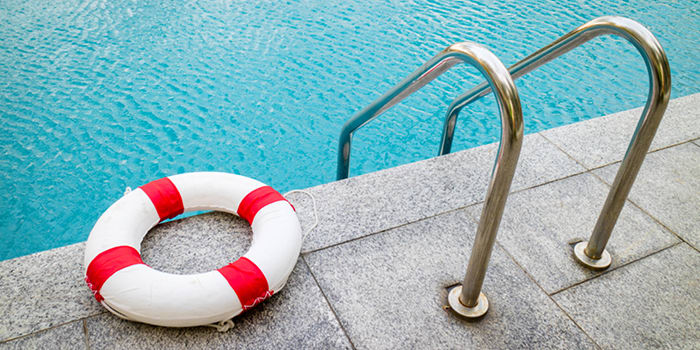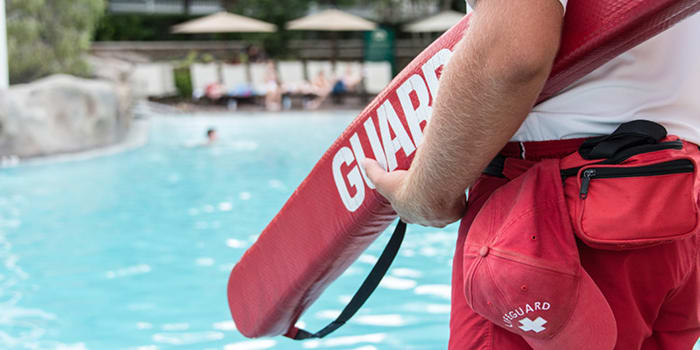Everything You Need to Know About HOA Pool Rules

While community pools offer a place to relax and have fun, they can also pose a safety risk when rules aren’t followed. Homeowners’ associations (HOAs) enforce community swimming pool rules to ensure the health and safety of residents and promote an enjoyable experience. Adhering to these policies helps homeowners avoid violations, maintain their amenity privileges, and contribute to a safer and more positive community. Each community is different and has its own unique rules, but for insight into general HOA pool regulations, read on.
Pool Etiquette Tips
As an HOA member, you want your neighborhood to be a warm and welcoming place to live. Creating a harmonious community starts with treating other residents and shared spaces, including your HOA pool, with respect.
Before heading to your community pool this summer, remember these pool etiquette tips:
- Be mindful and respectful of others in the pool area
- Promptly notify management of concerns
- If you experience issues, address them calmly and politely
- Follow your community’s amenity reservation policies
- Include your guests in the reservation
- Remind your children about community pool regulations regularly
Common Pool Rules
A recent homeowner satisfaction survey found that approximately 38% of homeowners’ associations offer a community swimming pool. As one of the most popular HOA amenities, pools can get particularly crowded during hot summer months, making it more important than ever to follow pool safety guidelines.
Official HOA pool rules vary by community, but you can keep your family safe and help others avoid potential injuries with these general community pool rules:
- No running in the pool area
- No diving (unless there are designated diving areas)
- No roughhousing or disruptive behavior
- No swimming while inebriated
- No overcrowding or going over the capacity
- Must wear proper swimming attire
Learn More: “Top Frequently Asked Questions about HOA Violations”
Health and Hygiene Pool Rules
When residents fail to follow basic health and hygiene rules at the pool, it can create hazardous conditions that affect everyone. The water can become contaminated, shutting down the pool for days or weeks. Without proper precautions, it’s also possible to spread germs through pool water.
To ensure a clean and healthy pool experience for HOA members and their guests, be mindful of these pool hygiene guidelines:- Shower before entering the pool, especially after a workout
- Avoid the pool area if you’re feeling sick
- If kids have diarrhea, don’t let them enter the pool
- Make sure babies wear clean swimming diapers
- Use sunscreen that doesn’t cloud the pool water
- Avoid swallowing pool water or getting it in your mouth

Age Restrictions and Supervision Guidelines
Toddlers and young children have the highest risk of drowning, especially between the ages of one and four. However, active supervision while kids are in and around the water can help prevent drownings and other accidents at the pool.
If you plan to take your kids to the pool, check community pool signs for age restrictions and supervision requirements, such as:
- Children under a certain age must be with an adult
- What age is considered old enough to supervise a child
- No children allowed during specific operating hours
- The days of the week when children can use the pool
- What areas of the pool are designated for adults only
- If children are required to wear flotation devices in the pool
Pool Equipment Usage and Safety
While your HOA board is responsible for pool maintenance and repairs, residents can do their part to support the association and community safety by reporting issues to the appropriate parties. Some things to look for and report when using your HOA pool include:
- Broken or worn-down tables, chairs, loungers, or other pool furniture
- Gaps in fencing
- Malfunctioning pool gates, locks, or latching mechanisms
- Loose pool handles, broken stairs, or ladders
- Burnt-out lights in the pool or around the pool deck
- Chipped or cracked tiles in the pool or hot tub
Related: “10 HOA Maintenance Tips for a Safer Summer”
Pool Rules for Food and Beverages
If you’re permitted to bring food and drinks to your community pool, it’s your responsibility to keep the area clean and safe by following these common residential pool policies:
- No glass or breakable dishware at the pool
- No food or drinks in the pool and hot tub
- Dispose of all waste in the proper receptacles
- Keep food and beverages in the designated areas
- Cover or put away food while using the pool
- In some communities, no alcoholic beverages in the pool area
Emergency Procedures and First Aid
Pool emergencies can happen in an instant. Fortunately, quick action with the proper safety and first aid equipment can help you avoid the worst. Depending on the requirements detailed in your governing documents, check that your community pool is equipped with the right tools, such as:
- A lifeguard on duty
- Ring buoys or rescue tubes
- A rescue pole with a hook or loop
- An accessible first aid kit
- Automated external defibrillator (AED)
- Signage with CPR and emergency procedures
HOA Rules Guidebook: Everything Residents Need to Know
Apart from enforcing community swimming pool rules, your HOA board is tasked with creating and following through with regulations and restrictions that support your association’s high standards. Understanding these rules and their impact on homeowners can help you better appreciate the benefits of community living.
Check out our ebook, “HOA Rules Guidebook: Everything Residents Need to Know,” to see how associations protect homeowners’ investments with enforceable rules.